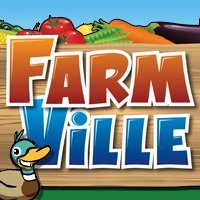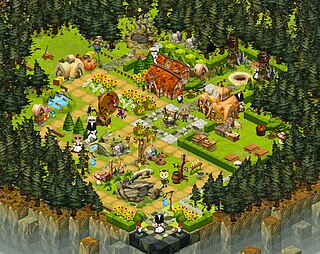
Brian Reynolds is an American videogame designer who is currently president of Firaxis Games. Reynolds has designed at SecretNewCo, Zynga, Big Huge Games, and MicroProse and has been chairman of the International Game Developers Association. He has played a major part in designing a number of multi-million selling games including Civilization II, Rise of Nations, Sid Meier's Alpha Centauri, and FrontierVille. He has also founded or co-founded three game companies, SecretNewCo, Big Huge Games, and Firaxis Games.

Zynga Inc. is an American developer running social video game services. It was founded in April 2007, with headquarters in San Mateo, California. The company primarily focuses on mobile and social networking platforms. Zynga states its mission as "connecting the world through games".

Mafia Wars is a defunct freemium multiplayer social network game created by Zynga. Players assume the roles of gangsters while building their own Mafia-type organization. The players fight and "rob" other players online - completing jobs, missions, and operations to gain rewards and strength in an endless game.

FarmVille is a series of agriculture-simulation social network games developed and published by Zynga in 2009. It is similar to Happy Farm and Farm Town. Its gameplay involves various aspects of farmland management, such as plowing land, planting, growing, and harvesting crops, harvesting trees and raising livestock. The sequels FarmVille 2 and FarmVille 3 were released in September 2012 and November 2021, respectively.
Playdom was an online social network game developer popular on Facebook, Google+ and Myspace. The company was founded in the San Francisco Bay Area by University of California, Berkeley graduates Ling Xiao and Chris Wang and Swarthmore College graduate Dan Yue. In 2009, the market for games played on social networking sites was valued at $300 million, consisting mostly of online sales of virtual goods.
Café World is a defunct multiplayer restaurant simulation social network game created by Zynga and launched in September 2009. It quickly became the fastest growing social game ever, reaching 8 million users in seven days, and peaked at over 10 million daily active users, which made it Zynga's third-largest game after FarmVille and CityVille. Available on Facebook, players strive to become master chefs and build a food empire by completing catering orders.

Friends for Sale was a massively multiplayer online business simulation game originally developed by Serious Business, available as an application on the social networking website Facebook. The game allowed players to buy and sell virtual pets representing other players. Since its launching by November 2007, Friends for Sale soared into popularity by June 2008, becoming one of the top ten Facebook applications with around 700,000 daily users and activity peaked at around 6.5 million monthly users on 2 November 2009 until Zynga acquired Serious Business on 11 February 2010.

Facebook Credits was a virtual currency that enabled people to purchase items in games and non-gaming applications on the Facebook Platform. One U.S. dollar was the equivalent of 10 Facebook Credits. Facebook Credits were available in 15 currencies including U.S. dollars, pound sterling, euros, and Danish kroner. Facebook was hoping eventually to expand Credits into a micropayment system open to any Facebook application, whether a game or a media company application. Facebook deprecated Credits in favour of users' local currencies.

Ravenwood Fair was a social network game on Facebook designed by John Romero and developed by Lolapps. Ravenwood Fair was launched on the Facebook platform October 19, 2010. The game closed down on July 18, 2013.
Zynga Poker is a social game developed by Zynga as an application for the social-networking website Facebook as well as Android, iPhone, Windows Phone, Windows, MySpace, Tagged, and Google+. It was launched in July 2007.
Kixeye is a video game company founded in July 2007 and headquartered in Victoria, British Columbia, Canada. The company creates, develops and publishes massively multiplayer online real-time strategy games (MMORTS) for PC and mobile devices. Kixeye gained popularity as a pioneer in midcore action games featuring real-time combat on the social networking website Facebook. Following their initial launch, Kixeye's games generated twenty times more revenue per daily active user than other social games, retaining active users five times longer on average.

Cow Clicker is an incremental social network game on Facebook developed by video game researcher Ian Bogost. The game serves as a deconstructive satire of social games. The goal of the game is to earn "clicks" by clicking on a sprite of a cow every six hours. The addition of friends' cows to the player's pasture allows the user to also receive "clicks" whenever the player's cow is clicked. A premium currency known as "Mooney" allows the user to purchase different cow designs and skip the six-hour interval between clicks.

CastleVille is a defunct social network game made by Zynga's Dallas studio and was released in November 2011. It combined a number of elements from the company's other "Ville" range of games. On launch it had received a million "likes" on Facebook. By the end of its first month, it had become the fifth most popular game on Facebook with 26.5 million players. The game was a freemium game, meaning there is no cost to play but players have the option of purchasing premium content.

Triple Town is a freemium strategy puzzle video game with city-building elements. It is available for social networks and mobile devices and was developed by Seattle-based Spry Fox.
Storm8 Inc. is a mobile social game developer founded in 2009 by former Zynga designer, Garrett J. Remes, as well as former Facebook engineers, including Perry Tam, William Siu, Chak Ming Li, and Laura Yip in Redwood Shores, California. Notable games include the Restaurant Story franchise, Dragon Story, Bubble Mania, Fantasy Forest Story, Castle Story and iMobsters.

Loot Drop was a social video game studio that was started in San Mateo, California. It was created by John Romero and Brenda Romero with veteran game designer Tom Hall heading up his own game. Its tagline was "Believe in fun".

Arjun Sethi is an American internet entrepreneur, investor and executive. He is co-founder and partner at venture capital firm Tribe Capital. He previously was partner at Social Capital and served as an executive at Yahoo! where he launched Yahoo! Livetext. Before that, he was co-founder and CEO of MessageMe and he was CEO of Lolapps, the developer behind Ravenwood Fair.

Spry Fox, LLC v. Lolapps, Inc., No. 2:12-cv-00147, was a court case between two video game developers, where Spry Fox alleged that the game Yeti Town, developed by 6waves Lolapps, infringed on their copyrighted game Triple Town. While the case was settled out of court, preliminary opinions by Judge Richard A. Jones affirmed that a video game's "look and feel" may be protected by copyright, affirming the federal district court decision in Tetris Holding, LLC v. Xio Interactive, Inc. from earlier the same year.

Stillfront Group is a Sweden-based company specialized in the acquisition and management of mobile and browser game studios.














